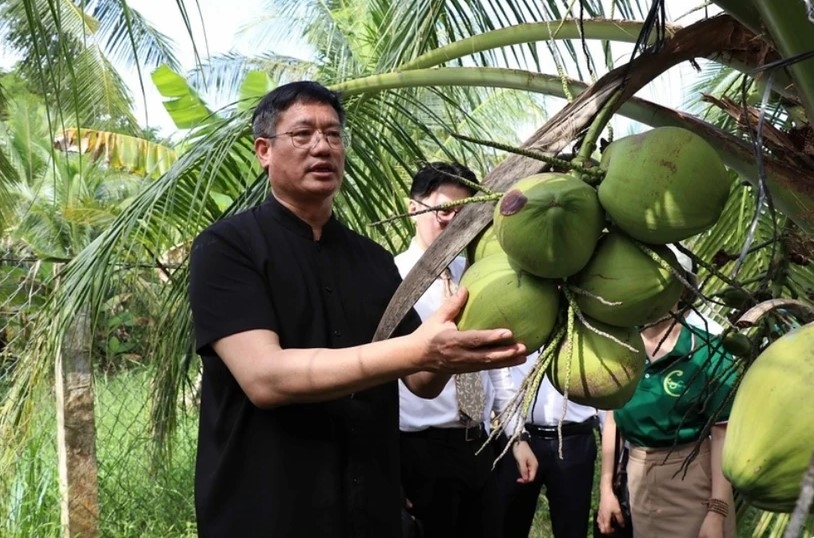Chinese enterprises survey coconut raw material areas in Tra Vinh
Society – Economy - Ngày đăng : 14:03, 21/12/2024
They aimed to explore the supply capacity and potential for exporting fresh coconuts and processed products from local businesses and cooperatives to the Chinese market.
During a meeting with the delegation, Tran Truong Giang, Director of the Tra Vinh Department of Agriculture and Rural Development, reported that the province ranks second nationwide, after Ben Tre, in terms of coconut cultivation area – 27,520ha, with an output exceeding 404,000 tonnes (equivalent to 337 million fruits). Notably, around 6,000ha meets EU, USDA, and Chinese standards.
The main coconut varieties grown in Tra Vinh include green and yellow coconut, as well as dwarf coconut, which account for 85% of the total farming area.
The quality and yield of coconuts in Tra Vinh are considered the best in the country. There are 29 coconut-growing zones granted production unit codes in the province, including ten qualified for export that cover an area of 1,392 ha, along with two packaging facilities for export to China.
Tra Vinh also boasts a large area of macapuno coconut, approximately 1,300 ha, producing about 3.16 million fruits annually.
Giang said that the province is focusing on sustainable coconut development, aiming for over 28,000 ha and an annual output of 520,000 tonnes (equivalent to 440 million fruits) by 2030. It plans to have farming zones meeting VietGAP and organic standards and given production unit codes to meet export requirements.
Additionally, Tra Vinh is enhancing technology application and transfer to boost productivity and quality to meet export needs while developing deep processing industries.
Consul General Wei highly valued the quality of raw material zones in Tra Vinh, particularly the unique macapuno variety and their processed products.
He emphasised that the Chinese Business Association will strengthen connections and trade cooperation with local growers, cooperatives, and businesses to facilitate export to China.
The diplomat called on Chinese enterprises to invest in deep processing of coconut products, asking local authorities to improve logistics. He also encouraged local businesses, cooperatives, and farmers to improve macapuno quality while reducing production and transportation expenses for Chinese companies.
Nguyen Quynh Thien, Vice Chairman of the Tra Vinh People's Committee, emphasised the province's commitment to fostering connections between local and Chinese businesses for exporting fresh coconuts and coconut products to the Chinese market. He expressed his hope for Chinese authorities to assist in brand protection, export standards, and regulatory compliance.
On this occasion, Tra Vinh and Chinese companies exchanged information about their operations, trade demand, and capabilities, and ended by signing a memorandum of understanding for cooperation.

